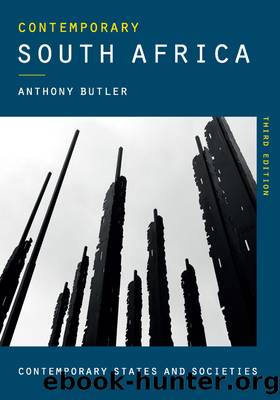Contemporary South Africa by Anthony Butler

Author:Anthony Butler [Butler, Anthony]
Language: eng
Format: epub
Tags: African, Political Ideologies, Political Science, World, General
ISBN: 9781137373380
Google: xa4sDwAAQBAJ
Goodreads: 722932
Publisher: Palgrave Macmillan
Published: 2004-03-04T00:00:00+00:00
The Judiciary
The third branch of government, the judiciary, is concerned with the application of the law. Laws are binding decisions that are made into rules and enforced by the state. In South Africa there is formal equality before the law: any law, in theory at least, is enforced equally on all regardless of position. Yet, the sources of law are not as clear-cut as one might expect. Law originates primarily in the legislatures, including âdelegatedâ legislation in different spheres of government. The Constitution sets out a clear hierarchy, in which the Constitution is supreme; below it are arrayed the national, then the provincial, and then the municipal spheres. Law can also originate in statutes promulgated by the executive or in âdelegated legislationâ. In addition, the courts themselves make new law in their interpretation and application of existing laws. âCommon lawâ, âcustomary lawâ, law established through the practice of âtraditionalâ courts, and Muslim family law are also recognised in South Africa, but are at the same time subject to the Constitution (implying that ultimately they will move into line with it).
The application of law is inevitably conflict-ridden. The courts must adjudge whether a right has been infringed, a legal offence committed, what the nature of the infringement might be, what exactly the law says, and how precisely the law ought to be applied. The system through which such judgments are made in South Africa involves a number of different types of court. Magistrates, appointed by the minister of justice, may serve in either district or (higher) regional courts, and deal with the overwhelming majority of cases. High courts, whose judges are appointed by the president, concurrently with the Judicial Services Commission, deal with appeals from lower courts but also with many constitutional issues. The Supreme Court of Appeal has been the highest court of appeal in all but constitutional matters.
The Constitutional Court is at the apex of the judiciary. All laws and state actions are supposed to be consistent with the Constitution (including its bill of rights). The Constitutional Court is a special and specialised court, which interprets, protects, and enforces the Constitution. It is âindependentâ, in that the Judicial Services Commission â a representative body comprising, in roughly equal measure, senior judges, parliamentarians, and acting lawyers â submits a list from which the courtâs judges must be chosen. The president and Cabinet then make appointments in consultation with party leaders in the NA. The key areas of jurisdiction of the court include the consistency of legislation with the Constitution, and disputes between spheres of government. The court also rules on the constitutionality of constitutional amendments (in which cases there are complex rules for different kinds of amendment) and on the consistency of government actions with the Constitution, including the bill of rights.
One key issue that has arisen in South Africa with regard to the role of the Constitutional Court is whether the courts are genuinely âindependentâ, given that a state president, or his party, can indirectly influence appointments. In addition,
Download
This site does not store any files on its server. We only index and link to content provided by other sites. Please contact the content providers to delete copyright contents if any and email us, we'll remove relevant links or contents immediately.
Harry Potter and the Goblet Of Fire by J.K. Rowling(3041)
Never by Ken Follett(2880)
Shadow of Night by Deborah Harkness(2718)
Ogilvy on Advertising by David Ogilvy(2682)
Zero to IPO: Over $1 Trillion of Actionable Advice from the World's Most Successful Entrepreneurs by Frederic Kerrest(2392)
The Man Who Died Twice by Richard Osman(2297)
Machine Learning at Scale with H2O by Gregory Keys | David Whiting(2289)
Book of Life by Deborah Harkness(2263)
How Proust Can Change Your Life by Alain De Botton(2261)
My Brilliant Friend by Elena Ferrante(2223)
0041152001443424520 .pdf by Unknown(2220)
The Tipping Point by Malcolm Gladwell(2204)
How to Pay Zero Taxes, 2018 by Jeff A. Schnepper(2098)
Will by Will Smith(2041)
Purple Hibiscus by Chimamanda Ngozi Adichie(1981)
Hooked: A Dark, Contemporary Romance (Never After Series) by Emily McIntire(1958)
Borders by unknow(1785)
Rationality by Steven Pinker(1764)
Daughter of Smoke and Bone by Laini Taylor(1742)
